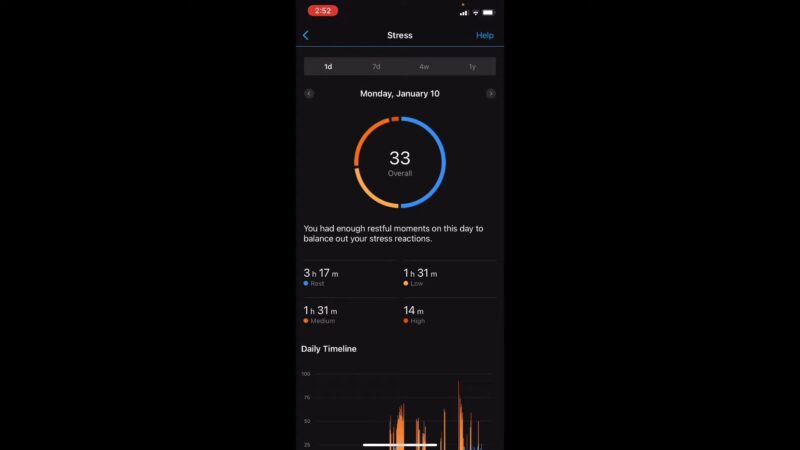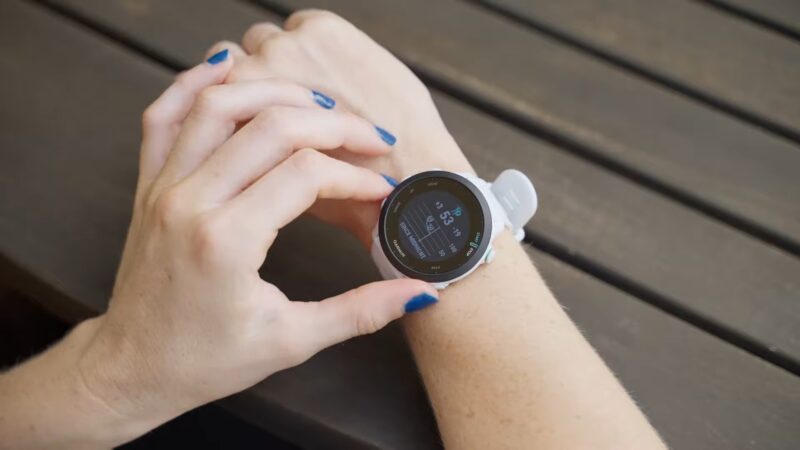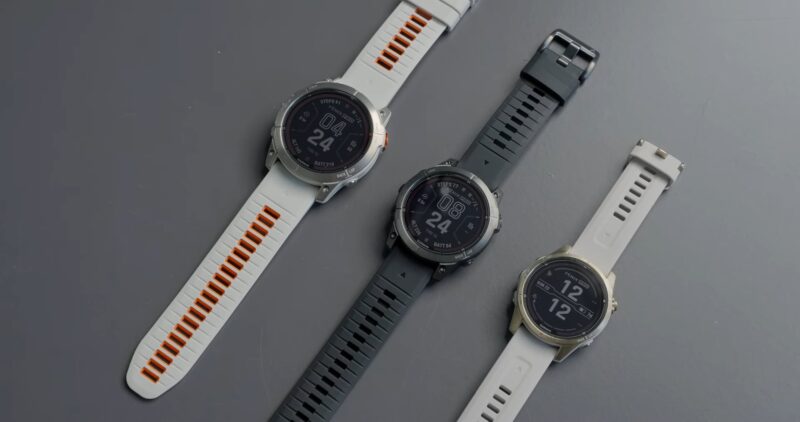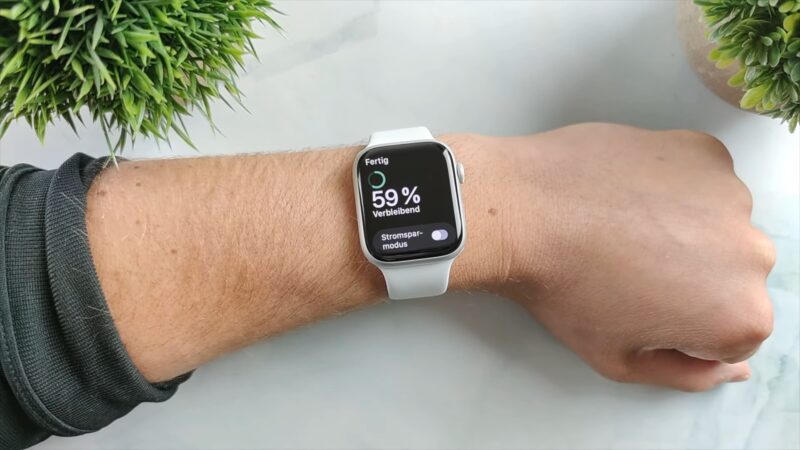Stress management has become more crucial than ever. Garmin, a brand synonymous with innovative technology, has introduced a feature that measures stress, providing users with insights that could potentially enhance their wellbeing.
Main Features

Understanding stress begins with deciphering the physiological signals our bodies emit. Garmin utilizes a scientific approach, tapping into our body’s natural responses to stress to provide users with tangible data.
The Role of Heart Rate Variability
Heart Rate Variability (HRV) is a key player in Garmin’s stress measurement technology. HRV refers to the variation in time intervals between consecutive heartbeats. It is influenced by various factors, including stress, making it a viable metric for assessing an individual’s stress level.
The Significance of HRV in Stress Assessment
HRV is not just a random metric; it’s closely linked with our autonomic nervous system (ANS). The ANS regulates involuntary body functions, such as heartbeat and digestion, and is divided into two branches:
- sympathetic nervous systems
- parasympathetic nervous systems.
By analyzing HRV, Garmin devices can infer the activity of these systems, providing a window into the user’s stress level.
Stress Level Scale

Garmin doesn’t merely provide raw data. It translates the complex physiological signals into a simple, user-friendly stress level scale, making the information accessible and easy to understand for users.
Understanding the Scale
The stress level scale ranges from 0 to 100, categorizing stress into several levels: Rest, Low, Medium, and High. This categorization is achieved by analyzing the HRV data and converting it into a format that’s easy for users to interpret and act upon.
Applying it in Daily Life
The utility of Garmin’s stress level scale extends beyond mere knowledge. By being aware of their stress levels, users can implement timely interventions, such as engaging in relaxation techniques, to manage their stress effectively.
The main issue for many people today is that they are dealing with various challenges. In many cases, it can lead to stress, or some even bigger issues like depression and anxiety.
Catastrophic thinking is another condition that should be recognized on time. This proactive approach can have a profound impact on an individual’s overall wellbeing and quality of life.
Stress Data and Lifestyle Management

Garmin’s stress measurement technology is not just a standalone feature. It is integrated into the broader ecosystem of Garmin’s health and wellness tracking functionalities, providing a comprehensive approach to lifestyle management.
Interlinking Stress and Physical Activity
- Stress and physical activity are interlinked.
- Engaging in physical activity can modulate stress levels.
- Garmin devices help users understand how their physical activities and stress levels correlate, enabling them to make informed decisions about their exercise routines.
Enhancing Sleep Quality through Stress Management
Sleep and stress share a bidirectional relationship. Garmin devices not only track sleep but also provide insights into how stress might be impacting the quality of one’s slumber.
By understanding this relationship, users can implement strategies to manage stress and potentially enhance their sleep quality.
Stress and Overall Health

Navigating through the labyrinth of stress and its impacts on health, it becomes imperative to understand how Garmin’s stress measurement can be a pivotal tool in safeguarding our overall well-being.
Stress and Its Multifaceted Impact on Health
Stress, while often perceived as a mental or emotional challenge, casts a wide net, impacting various aspects of our physical health. Chronic stress has been linked to a myriad of health issues, including heart disease, diabetes, and weakened immune function.
By providing a tangible measure of stress, Garmin allows users to become aware of their stress levels, potentially identifying patterns or triggers that may be impacting their health.
It is crucial to be aware of the fact that it can lead to some serious conditions. For example, the WebMD states that it can lead to the insulin resistance, or make it harder to cope with it:
“Stress can worsen diabetes in two ways. First, it increases the likelihood of bad behaviors, such as unhealthy eating and excessive drinking. Second, stress seems to raise the glucose levels of people with type 2 diabetes type 2 diabetes directly.”
Garmin as a Preventative Health Tool
Garmin’s stress measurement feature can be viewed as a preventative health tool. By identifying periods of high stress, users may be able to implement strategies to manage it before it negatively impacts their health.
This might include incorporating mindfulness practices, adjusting work schedules, or identifying and addressing stress triggers.
User Experience

In a world where technology and health are becoming increasingly intertwined, the user experience is paramount.
Garmin’s stress feature is not merely a technological marvel but is also designed with the user in mind, ensuring that the technology is accessible and beneficial to all.
Ease of Use and Accessibility
Garmin has ensured that its stress measurement feature is not only scientifically robust but also user-friendly. The stress level scale is straightforward and easy to understand, providing users with immediate insights into their current stress levels.
The simplicity of the scale, coupled with real-time monitoring, allows users to quickly assess their stress levels at any given moment.
Stress Management
Garmin’s stress feature doesn’t just stop at providing data. Users can leverage this data to personalize their stress management strategies. By observing patterns in their stress levels and identifying potential triggers, users can tailor their stress-reducing activities to their unique needs, ensuring that their approach to stress management is as effective as possible.
The Future of Stress Management Technology

The evolution of stress management tools like those offered by Garmin opens up a wide range of possibilities in enhancing our approach towards mental wellness.
The Evolution of Measurement
While Garmin’s current stress measurement technology provides valuable insights, the field of biometrics is continually evolving. Future iterations of Garmin devices may offer even more precise and varied stress metrics, potentially incorporating additional physiological markers or utilizing artificial intelligence to provide more nuanced insights into user stress levels.
The Broader Implications
The integration of stress measurement technology into wearable devices has broader implications for public health and wellness.
As these technologies become more advanced and accessible, they have the potential to play a significant role in preventative health care, enabling individuals to take a proactive approach to manage stress and, by extension, their overall health.
FAQs
How does Garmin’s stress level measurement compare to professional psychological assessments?
Garmin’s stress level measurement is based on physiological data, specifically Heart Rate Variability (HRV), and provides a general indication of stress levels throughout the day. Professional psychological assessments, on the other hand, often involve detailed questionnaires and may be conducted by licensed psychologists to gain insights into an individual’s mental and emotional state. Garmin’s technology provides a quick, real-time gauge of physiological stress but does not offer the depth or specificity of a professional assessment.
Can Garmin devices differentiate between positive and negative stress?
Garmin devices measure physiological markers of stress, particularly HRV, which do not inherently differentiate between positive (eustress) and negative (distress) stress. Both forms of stress can cause similar physiological responses. Therefore, while Garmin provides valuable data regarding stress levels, it does not distinguish between the emotional or situational contexts that might differentiate positive from negative stress.
How accurate is Garmin’s stress level measurement in various physical conditions, like after exercise or consuming caffeine?
Physical conditions and substances like exercise or caffeine can influence HRV and, therefore, might impact the stress level readings on Garmin devices. For instance, exercise and caffeine can both temporarily decrease HRV, potentially indicating higher stress levels on the device even if the user does not subjectively feel stressed. It’s essential to consider these factors when interpreting stress level data and to view the readings as one piece of the overall wellness puzzle.
How should users interpret sudden spikes in stress levels on their Garmin devices?
Sudden spikes in stress levels, as indicated by Garmin devices, might be influenced by various factors, including physical activity, caffeine intake, emotional stress, or other physiological responses. It’s crucial to consider the context in which these spikes occur and to utilize additional information (such as physical activity data or sleep data) to interpret them accurately. Sudden or unexplained changes in stress levels might warrant further exploration and, if related to emotional well-being, potentially a discussion with a healthcare professional.
Can the stress level feature on Garmin devices be used to manage chronic stress or anxiety disorders under a healthcare professional’s guidance?
While Garmin’s stress level feature provides valuable insights into physiological stress markers, it is not a diagnostic or therapeutic tool. However, some individuals and healthcare professionals might find the data useful as part of a comprehensive stress management plan. It’s crucial that any approach to managing chronic stress or anxiety disorders is discussed and approved by a healthcare professional to ensure it is safe and appropriate for the individual’s circumstances.
The Bottom Line
Garmin, with its innovative stress measurement technology, has carved out a niche in the wellness technology market, providing users with a tool that is not only scientifically advanced but also user-friendly and accessible. The future of stress management technology looks promising, with a potential to enjoy using even more accurate and more capable devices that will help us stay in good condition.
